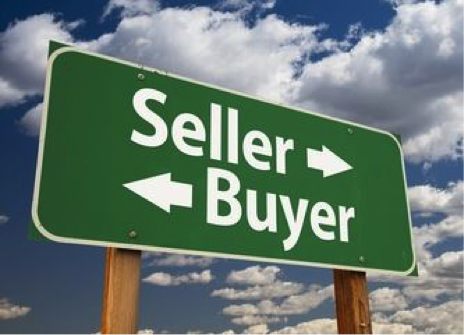For those who’re ready to take the entrepreneurial leap, starting a business from scratch might not be the only option. When you build a business from ground up, there’re many challenges in the same including initial set up, finding early customers, hiring key employees, managing cash flow, etc. These issues are negated when you choose to buy a business which has a proven track record of customers, internal processes, revenue and profit. If you’re asking yourself ‘How can I buy a business?’ this article is for you.
Factors to consider when buying a business
Buying a business can be an arduous task, especially if you’re a first time business buyer. The following factors need to be kept in mind before you start the process -
What domain are you comfortable in?
It’s always best if you buy a business in a domain you know and understand. Ex. If you’ve worked with customers in retail analytics, buying a retail shop would work well for you, as you understand the business.
Which geography can you operate in?
Are you willing to travel a long distance (within your city or another city altogether) to run the business? Or are you looking for something within the vicinity of your home? It plays a crucial part in selecting the business you want to buy
What’s the size of the company you can buy?
You might want to buy a big and flourishing business, but these businesses can be expensive to purchase. Plus, you might not have the experience to handle a business of such scale. But if you buy a very small business, it might not give you the required financial benefit you’re looking for. Be clear on the size of the business you want to buy, in terms of number of employees, revenue, floor size, etc.

Meeting of minds between buyers and sellers is a difficult task
How can I buy a business? (Process)
While buying a business, it’s best to stick to the flow explained below -
1) Pick domain and size of business you want to purchase
This has been highlighted in the above section
2) Find potential businesses you can buy
There’re a few ways to find businesses for sale. They include:
a. Online – Platforms like SMERGERS (www.smergers.com) provide information for businesses that are for sale. You can use these services to reach out to seller.
b. Business Brokers – Business brokers help entrepreneurs in buying and selling businesses. If you’re looking to buy a business, they’ll you help in finding potential businesses to purchase, apart from hand holding you through the entire process.
c. Local newspaper ads – You can look for ‘Businesses for sale’ ads on local classifieds. You could also post your own ad and wait for responses from the business community.
3. Meeting potential owners and picking your best fit
It’s important that you spend time with as many business owners as possible and understand how they run their business. Building a rapport with the seller pays off in the long run, especially if you move ahead with the purchase. Also, this helps in getting perspective on how different entrepreneurs run their business.
Once you’ve done your research, pick the business/business that you feel most comfortable with and carry on to the next stage.
4. Due diligence
Performing the due diligence on an existing business requires time, skill and expertise – Put together a small team consisting of an accountant, an auditor and a lawyer to help you with the same. The list of things you need to check prior to the purchase include -
a. Inventory
b. Company registration and regulatory compliances
c. Audit of financial statements including accounts payable/receivables
d. Customer feedback
e. Employee feedback including assessing everyone’s strengths, weaknesses, work contracts and salaries
f. Existing marketing strategy, execution and ROI
g. Gauging the reputation of the business in the market
Agreeing on the price
The sale price can depend on a variety of factors - How badly does the seller want to exit the business? What’re the reasons for the same? What’re the macro economic conditions at the moment? What’s the price a similar business was recently sold for? Having an understanding of all these factors will help you get a better understanding of the price you can pay for the business.
There’re many methods for putting a price on the business
a. Multiplier method
In this method, you take assign a multiple of the revenue/profit after tax, etc. and give a value for the business. Ex. With a 10X multiplier, a business giving a profit after tax of $100,000 can be valued at $1,000,000.
The multiple value depends on the market and recent acquisitions in that market.
b. Discounted Future Cash Flow
In this method, you can make revenue and profit projections for the next 5-10 years, and discount the same to arrive at a present market value for the business. This is a difficult method to calculate value of small businesses.
c. ROI
A simple way to value a business is to see the return on investment provided by the business and arrive at a valuation. Small business typically provide returns of 15-30% on the capital invested, so if you’re buying a business with a post-tax profit of $100,000, you can value it at $500,000 if you’re looking at a 20% ROI per year.
Sale type
You need to consider the sale type you want to pursue i.e. Asset sale vs Stock sale.
Financing the deal
It’s best if you put 50% of the cash from your pocket and finance the rest through a lender / investor / seller financing. Many sellers are fine to take a deferred payment through the next 2-3 years as it assures them of future income, and there’re insurance companies that insurance against the possible default by buyer. Plus, tax for the seller are reduced through a deferred payment strategy (the same has been explained in another blog (link)).
Other ways to finance the deal include -
a. Take loan against assets owned by seller
b. Partner with someone for buying (Ask seller if there was anyone else interested in buying, but didn’t have enough cash)
c. Lease, with an option to buy – Many sellers will be willing to lease the business to you for a period of 3-5 years, while giving you an option to buy the company at any point during the lease
d. Set up ESOP and raise cash from existing employees – Through this method, you get the cash you want, and the employees will be more motivated to work as they all own a part of the business
Closing the deal and transition
Once you’re through with your due diligence, and you’ve figured out your financing options, it’s time to pull the trigger. Your lawyer will help you with the paperwork and auditor/account with the finances.
Working on the transition phase post-closing of the transaction is very important as customers, suppliers and employees need to adjust to new management. Your seller will help you learn the business and operations in a transition phase which can last anywhere between 3-12 months. You should spend this time making everyone in the eco-system comfortable with your working style and learning how to operate the business as well.





































